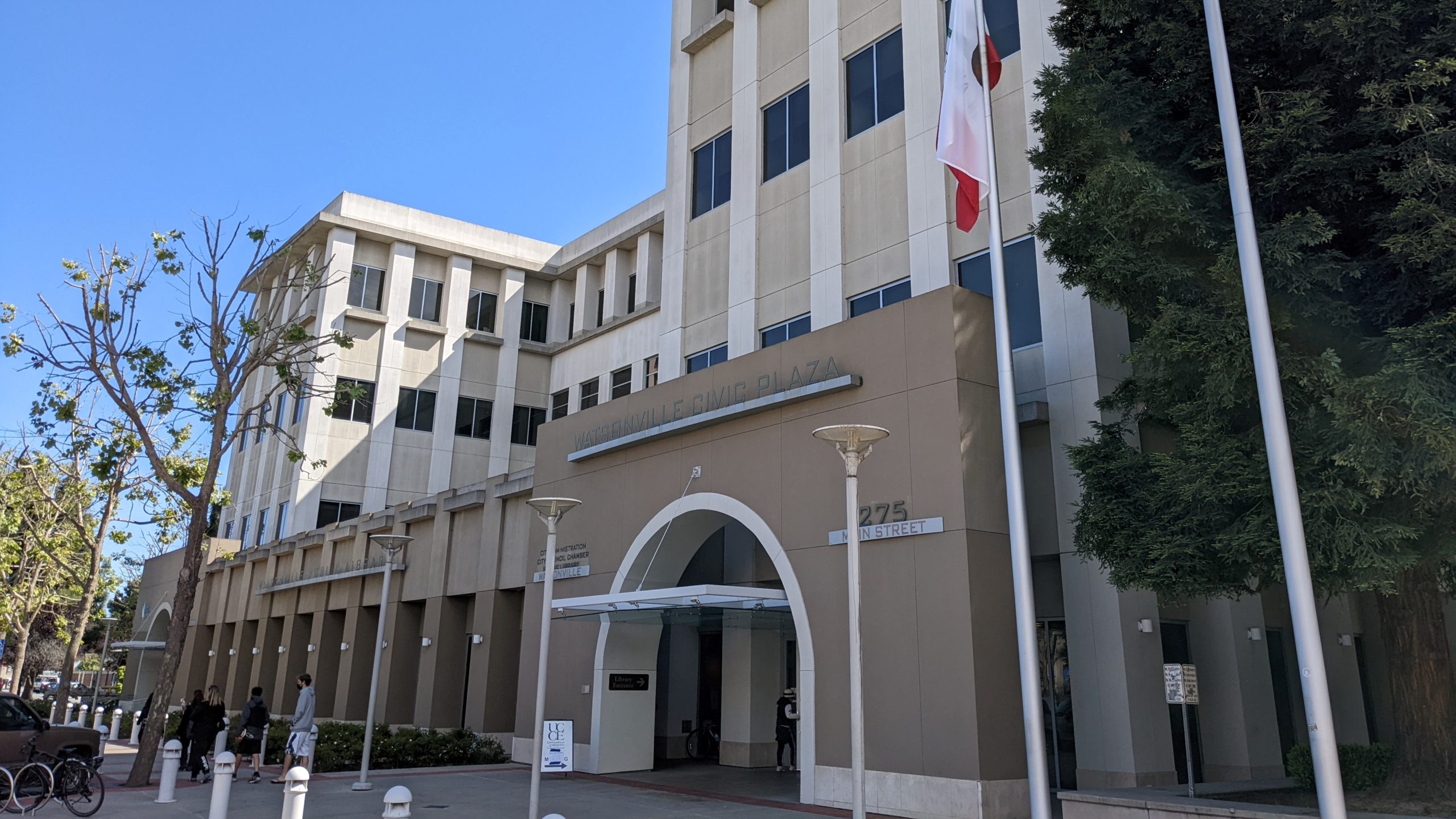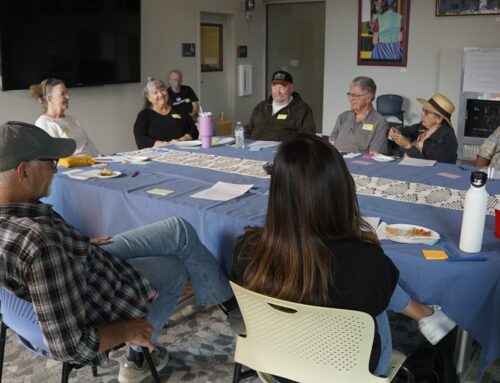Read Santa Cruz Local's Election Guide

Watsonville voters in November will decide whether to raise the city’s sales tax to 9.75% from 9.25%. (Stephen Baxter — Santa Cruz Local)
WATSONVILLE >> Watsonville voters will decide whether to raise the city’s sales tax with Measure R in the Nov. 8 election.
What is Measure R?
Measure R, or the City of Watsonville Community Investment Tax Measure, would provide a projected $5.1 million to Watsonville’s General Fund by raising the city’s sales tax to 9.75% from 9.25%. The additional tax tries to address many residents’ stated needs of more community infrastructure and social programs. Money is supposed to be prioritized for those services, but the money will go into the city’s General Fund where it is not legally bound for any specific use. The measure needs more than 50% of the vote to be adopted.
What would Measure R do?
If Measure R is adopted, an additional 0.5% sales tax will be added to the current 9.25% sales tax on goods purchased in Watsonville. Groceries and prescription medicine are exempt from sales tax.
Measure R as it appears on the Nov. 8 ballot:
City of Watsonville Community Investment Tax Measure. To provide locally-controlled funding for Watsonville’s essential general services, including: after-school and anti-gang programs that keep kids safe; creating safe places to play; keeping parks/ Watsonville Slough trails safe and clean; repairing, expanding, improving parks/playgrounds; fixing potholes; maintaining streets; creating jobs; supporting local businesses, libraries, senior meal programs and general government use; shall the City of Watsonville measure be adopted levying one-half cent sales tax, until ended by voters, providing $5 million dollars annually, with community oversight?
The city’s impartial financial analysis projects $5.1 million in annual revenue from the tax. City leaders hope to spend the money on after-school and anti-gang programs, as well as repair and expansion of parks and playgrounds, street maintenance and support of businesses, libraries, senior meal programs, and general government use, according to the ballot question and text of the measure and ballot question.
However, those priorities are not legally binding. The money from the sales tax hike ultimately would go into the city’s General Fund where it is not restricted for a specific use. “We made it a general, non-specific tax so that the future council can have flexibility on meeting the needs as they arise,” Watsonville City Councilmember Lowell Hurst said in an interview.
René Mendez, Watsonville’s city manager, said that while the money technically could be used for any purpose, city leaders have a vision for this tax to help pay for parks and recreation services. “We are asking the community to keep that vision moving,” Mendez said in an interview in September.
A more specific tax measure would have required 66% yes votes whereas this general measure requires more than 50% yes votes. Mendez said the general tax measure also polled higher among Watsonville residents.
Passage of the measure would create a City Revenue Measure Oversight Committee to ensure revenue is being spent as promised to Watsonville residents. Meeting multiple times a year, the committee would provide independent verification that expenditures are consistent with community needs. The findings would be submitted for public review at a public meeting. Mendez said this committee would likely meet four to six times per year.
“It’s important to be as transparent as possible so we’ll be setting up a separate committee for this sales tax measure,” said Mendez.
What does a “yes” vote mean?
The sales tax rate would increase by 0.5%, bringing it to 9.75%. All revenue would go into the city’s General Fund and would be spent on general services.
What would a “no” vote mean?
A “no” vote on Measure R would not add an additional 0.5% local sales tax.
Thing to consider about Measure R
Watsonville’s total budget for the 2022-23 fiscal year is $211 million.
The city’s General Fund spending is projected to be $52.6 million in fiscal year 2022-2023. Its General Fund revenue is projected to be $48 million, which leaves a $7 million gap, Watsonville City Manager René Mendez said.
“It’s how you look at it,” said Mendez. “If you look at our 5-year plan, we show a $7 million deficit. Our expenses go way down in 2023-24 because of one-time expenses,” Mendez said. “We’re not in a really bad situation.”
When asked whether city employees’ unfunded pension liabilities were a factor in the city’s budget situation, Mendez said the city was taking an “aggressive stance” on pensions but declined to comment further.
A factor in Measure R’s passage could be recent inflation. Consumers’ costs of goods have increased 5.7% in the San Francisco Bay Area in the past year, according to the U.S. Bureau of Labor Statistics.
Watsonville saw a “pretty decent economy” in the past few years, said Hurst, the longtime city council member. The tax measure seeks to use the economic momentum to put local money into local projects, Hurst said.
A sales tax hike would not only affect Watsonville residents, but also visitors who make purchases in the city. “It’ll be a shared cost and certainly a shared benefit for everybody in the region,” said Hurst.
Other cities’ sales taxes
- Scotts Valley voters approved a 9.75% sales tax with the passage of Measure Z in 2020. Scotts Valley city officials attribute their city’s improved financial outlook to revenues from Measure Z.
- In June, Santa Cruz city voters narrowly struck down a sales tax hike with Measure F. It would have raised Santa Cruz’s city sales tax to 9.75% from 9.25%. It would have raised an estimated $6 million for the city’s General Fund, city leaders said. The vote was 50.15% in favor and 49.85% against Measure F.
- Santa Cruz County’s sales tax cap is 9.75%, but other California counties have higher caps. Some of the highest sales tax rates in the state are in the San Francisco Bay Area. Fremont, Hayward and Alameda had 10.75% sales tax rates as of August.
Arguments in favor of Measure R
Proponents of the measure have said the tax money:
- Stays in Watsonville. Because it is a local tax, no funds will be taken by the state.
- Will generate revenue from visitors spending money in the city.
- Requires independent citizens’ oversight.
In the written argument for Measure R published in the county’s voter guide, proponents wrote that Measure R money would not go toward administrative salaries or pensions. However, Measure R money would go in the city’s General Fund, which pays for many city services and costs, including salaries and pensions. The money would not be restricted and could be used for “any legitimate municipal government purpose,” according to an impartial analysis by the city attorney.
Arguments against Measure R
There was no organized opposition to Measure R as of early September. Critics of sales tax hikes have said that such taxes are regressive in that they raise living expenses for residents who can least afford it.
More Information
- Text of Measure R
- Impartial analysis of the Measure R, 2022
- Fiscal impact report of Measure R, 2022
- Official ballot guide argument in favor of Measure R
- City of Watsonville 2022-23 budget
- How to register to vote
Santa Cruz Local’s news is free. We believe that high-quality local news is crucial to democracy. We depend on locals like you to make a meaningful contribution so everyone can access our news. Learn about membership.
Alyssa Shook is a Santa Cruz-based journalist and a recent graduate of Sacramento State's journalism program. Shook is working on a master's degree in education and single-subject English teaching credential at UC Santa Cruz.





